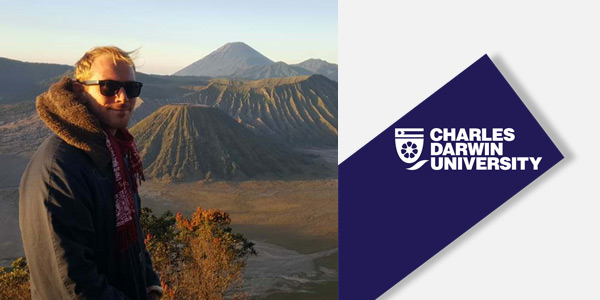
Matthew Owen is a New Colombo Plan Mobility and Internship Grant recipient from Charles Darwin University. Matthew completed ACICIS’ Development Studies Immersion Program at Gadjah Mada University in Semester 1, 2018.
Q: Why did you decide to undertake ACICIS’ Development Studies Immersion Program?
My degree at Charles Darwin University requires students to undertake a 400-hour or 50-day professional placement. ACICIS’ Development Studies Immersion Program provided me with this opportunity alongside a 2-month language component at Universitas Gadjah Mada (UGM), complimented with culture seminars and field trips. This was very appealing to me as I wanted to fully immerse myself in a program that was structured, supportive and offered extended learning opportunities while living in-country.
Q: What classes/units are you currently enrolled in?
At Charles Darwin University I am undertaking two units: HCS350 Professional Practice Placement and HCS365 Integrated Methods of Humanitarian and Community Studies. These units are to be completed concurrently with our professional placement and provide several useful learning resources.
Q: Are you involved in any clubs/societies at the university?
I joined the UGM Buddy Club while studying at UGM. The Buddy Club provides opportunities for national and international students to socialise and have a more diverse and multicultural university experience. However, my internship is based one hour outside of Yogyakarta City in the town and regency of Klaten which makes these opportunities more difficult to access. I am still looking for new opportunities to engage with locals, my support staff and fellow interns while I am living in Klaten in order to improve my language and social development while I am living away from the University and Yogyakarta.
Q: How will the Development Studies Immersion Program influence your future career or study?
The program will allow me to further my future career aspirations by providing me with the basic foundations of Bahasa Indonesia as well as allowing me to build up my time living in-country. These skills and experiences are essential for those who are seeking work with international non-government organisations.
Q: How does development in Indonesia differ to what you’ve seen before?
Development in Indonesia is unique in that it is so broad – it covers everything from infrastructure to domestic violence and gender issues. As the country develops and the population of the archipelago continues to grow at a rapid rate, these issues will be exacerbated and it is up to the government and NGO’s to work together to tackle these national issues.
Q: What do you like to do in your spare time in Yogyakarta?
I spend my spare time in Yogyakarta visiting the different restaurants and warungs located around the city, trying as much traditional food as possible without exploding! I also like to visit the billiard rooms that are dotted around the north and south regions with friends from the ACICIS program and those I have met on my travels. Finally, I like to spend my weekends travelling around Central and East Java to the different cities via the train network or by utilising the Go-Car or Grab applications.
Q: Are you undertaking an internship while in Indonesia?
I am currently undertaking a two-month internship with Rumah Energi in their Biru Biogas Rumah Program located in the Klaten Regency – approximately one hour away from Yogyakarta City. This organisation aims to provide sustainable and renewable energy sources to rural people and promote the use of biodigesters across the Indonesian archipelago. The role of an intern within this organisation is to learn about the technical and operational components of biogas and biodigesters, engaging in presentations, classes and activities during our time in the office. Other time with this organisation is spent travelling around Central Java and the Special Region of Yogyakarta conducting monitoring and evaluation on pre-existing and potential sites for biogas reactors in family homes, villages and businesses.
Q: What is your favourite food/place to eat?
In Yogyakarta City there is an abundance of restaurants, warungs and small angkringan stalls/carts that line the streets and alleys around the city. Some of my favourite places to eat are Bungong Jeumpa which specialises in traditional Aceh dishes such as egg noddles and roti cane – each with its own spicy Aceh twist. The House of Raminten is a place where anyone who visits Yogyakarta must have dinner at least once. With its traditional interior and tasty array of Indonesian dishes this was surely one of my eating highlights in Indonesia – I have visited there several times already, with friends and my mother when she visited.
Q: What is your favourite Indonesian word/phrase:
My favourite Indonesian phrase is tidak apa-apa which loosely translates to no worries or no problem in English. Coming from Australia, this is a common phrase used in a multitude of situations and conversations and it can be used similarly in Indonesia. Whenever confronted or responding to a request it is easy to just remember tidak apa-apa and smile!
Q: What places in Indonesia have you visited during your semester so far?
I have visited several different cities and locations thanks to my time with ACICIS and with Rumah Energi. Some of the regencies that we have visited part of my internship so far have been: Purworejo, Bantul, Imogiri, Mt. Merapi, Boyolali, Salatiga, Semarang, and Wonosari. Some of the cities I have travelled to in my own personal time have been Surakarta (Solo), Malang, Surabaya, Pacitan, Mt. Bromo and the surrounding areas of these places such as temples, waterfalls and mountain tracks providing spectacular views of the country side.
